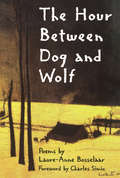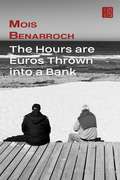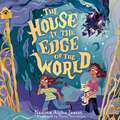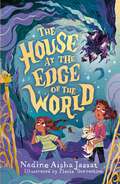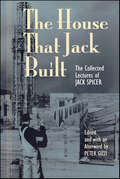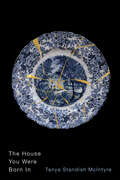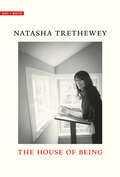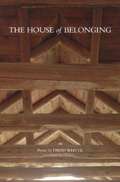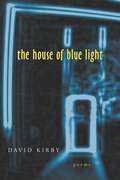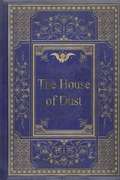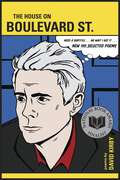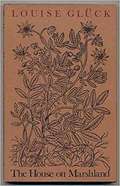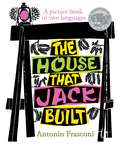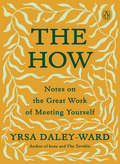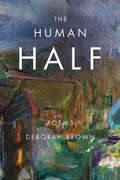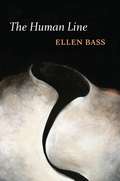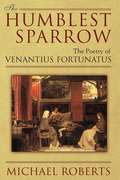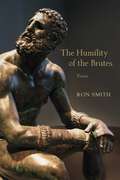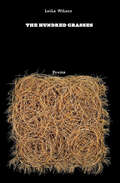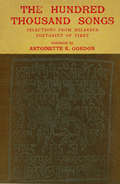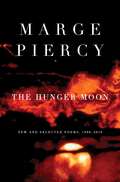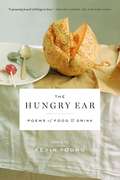- Table View
- List View
The Hour Between Dog and Wolf (New Poets of America)
by Laure-Anne BosselaarLaure-Anne Bosselaar's poetry captures the lives of "lost souls roaming"--be they young girls in convents, merchants, whores, widows, soldiers. Old Europe still lives in Bosselaar's rich language: Entre chien et loup, as it's known in Flanders--the time at dusk when a wolf can be mistaken for a dog.
The Hours are Euros Thrown into a Bank
by Mois BenarrochLast book of Benarroch in Spanish, with short poems and more short ones, some of them published directly in twitter in the last years. Mois Benarroch won the Amijai prize for poetry in 2012, and is one of the most translated poets of this decade worldwide.
The House At The Edge of The World
by Nadine Aisha JassatOn a cliff far away is a house at the edge of the world: Hope House. But it isn't like any other...When eleven-year-old Amal and her family inherit a house from a long lost relative, they can't believe their luck. But only Amal seems to notice there's anything unusual about it. Like the way the beds make themselves or the dishes never need cleaning, almost as if the house is taking care of them...But then a mysterious woman arrives claiming she is the house's true owner - and she gives Amal's family four weeks to leave before she demolishes it completely.The clock is ticking, and Amal is determined to save Hope House from destruction and stop her family from losing their new home. She needs to investigate who left them the house in the first place. Why did they choose Amal's family to protect it? And who is this woman threatening to tear it down?A mystery about family, identity and belonging. This story is perfect for fans of Matt Goodfellow, Onjali Q. Raúf or Disney's Encanto.
The House At The Edge of The World
by Nadine Aisha JassatHope House is more than just a building - it's a place of magic and mystery. . .When Amal and her family unexpectedly inherit the enchanted clifftop home, they can't believe their luck. But their joy is short-lived when a mysterious couple arrives, claiming the house is theirs and giving Amal's family just thirty days to pack up their stuff and leave before they demolish it completely.The clock is ticking, and Amal is determined to save Hope House from destruction. How will she unravel the secrets of the house and its mysterious benefactor in time to save it?A page-turning, lyrical mystery with a magical twist, perfect for fans of Matt Goodfellow, Onjali Q. Raúf and Disney's Encanto. Featuring accessible text in verse and beautiful illustrations throughout.
The House That Jack Built: The Collected Lectures of Jack Spicer
by Jack SpicerThe House That Jack Built collects for the first time the four historic talks given by controversial poet Jack Spicer just before his early death in 1965. These lively and provocative lectures function as a gloss to Spicer's own poetry, a general discourse on poetics, and a cautionary handbook for young poets. This long-awaited document of Spicer's unorthodox poetic vision, what Robin Blaser has called "the practice of outside," is an authoritative edition of an underground classic.Peter Gizzi's afterword elucidates some of the fundamental issues of Spicer's poetry and lectures, including the concept of poetic dictation, which Spicer renovates with vocabularies of popular culture: radio, Martians, and baseball; his use of the California landscape as a backdrop for his poems; and his visual imagination in relation to the aesthetics of west-coast funk assemblage. This book delivers a firsthand account of the contrary and turbulent poetics that define Spicer's ongoing contribution to an international avant-garde.
The House You Were Born In (Hugh MacLennan Poetry Series)
by Tanya Standish McIntyrea keeper of things forgotten, a vase / for pictures made by words, a riverbed / for the stories you tell, an earthen silhouette / of a childWith vivid imagery and endless compassion for her subjects, Tanya Standish McIntyre’s words breathe life. Her richly lyrical phrases capture both the fear and the beauty of growing up in a rural working-class community, anchored by the magical bond between a young girl and her grandfather. Way’s Mills, Quebec, is the setting for these poems, although as with Mark Twain’s Mississippi, physical place becomes a place in the heart in this elegy for lost ancestral farms. Standish McIntyre gives voice to the unspoken, shining a light into the dark corners of our collective memory to reveal an indelible past that gleams with clarity, empathy, and humanity. Taking seed in the dilapidated barns and warm sunlit rooms of Standish McIntyre’s personal history, these poems weave a filigree of well-worn remembrances and time-honoured treaties of the self, half forgotten yet ever lingering. Lucid, sharp, and crisp as spring water, this collection holds a sweeping narrative power that will stay with you long after the last line.
The House of Being (Why I Write)
by Natasha TretheweyAn exquisite meditation on the geographies we inherit and the metaphors we inhabit, from Pulitzer Prize winner and nineteenth U.S. poet laureate Natasha Trethewey “Searching and intimate, this impresses.”—Publishers Weekly In a shotgun house in Gulfport, Mississippi, at the crossroads of Highway 49, the legendary highway of the Blues, and Jefferson Street, Natasha Trethewey learned to read and write. Before the land was a crossroads, however, it was a pasture: a farming settlement where, after the Civil War, a group of formerly enslaved women, men, and children made a new home. In this intimate and searching meditation, Trethewey revisits the geography of her childhood to trace the origins of her writing life, born of the need to create new metaphors to inhabit “so that my story would not be determined for me.” She recalls the markers of history and culture that dotted the horizons of her youth: the Confederate flags proudly flown throughout Mississippi; her gradual understanding of her own identity as the child of a Black mother and a white father; and her grandmother’s collages lining the hallway, offering glimpses of the world as it could be. With the clarity of a prophet and the grace of a poet, Trethewey offers up a vision of writing as reclamation: of our own lives and the stories of the vanished, forgotten, and erased.
The House on Boulevard St.: New and Selected Poems (Southern Messenger Poets)
by Professor David Kirby?
The House that George Built
by Suzanne SladeWhen George Washington took office, he was determined to build a fine home for future presidents. He was involved in every step of the process, from selecting the location to figuring out how to get thousands of heavy bricks to the construction site. George never got to live in his President's House, but every president since has called it home.
The House that Jack Built: A picture book in two languages
by Antonio FrasconiGenerations of children have delighted in the nursery rhyme about Jack and his house. Starting with the familiar refrain "This is the house that Jack built. This is the malt that lay in the house that Jack built," the age-old chant expands to include the maiden all forlorn, the cow with the crumpled horn, and other distinctive characters.This Caldecott Honor-winning picture book offers an additional attraction to the traditional tale: all of the verses appear in French as well as English. From the opening, "Voici la maison que Jacques a bâtie. Voici le malt que se trouvait dans la maison que Jacques a bâtie," to the grand conclusion, the repetition of catchy rhymes provides effortless reinforcement of French words and phrases. Brilliantly colored woodcut illustrations by renowned artist Antonio Frasconi add an ageless beauty to this keepsake edition.[back flap copy]Antonio Frasconi (1919–2013) was an artist of international fame whose work is represented in leading art museums around the world, including New York City's Metropolitan Museum of Art and Museum of Modern Art as well as the National Gallery of Art in Washington, D.C. The Uruguayan-American artist was raised in a bilingual setting, which fostered his belief that children should be made aware of other languages early in life and led to his use of multiple languages in his award-winning picture books.
The How: Notes on the Great Work of Meeting Yourself
by Yrsa Daley-WardFrom the acclaimed poet behind bone, an exploration of how we can meet our truest selves, the ones we've always been meant to becomeYrsa Daley-Ward's words have resonated with hundreds of thousands of readers--through her books of poetry and memoir, bone and The Terrible; through her writing for Beyoncé on Black Is King; and through her always illuminating Instagram posts.Now, in The How, Yrsa encourages readers to begin, as she puts it, the great work of meeting ourselves. This isn't the self we've built up in response to our surroundings, or the self we manufacture to please the people around us, but instead, our most intimate self, the one we visit in dreams, the one that calls to us from a glimmering future.With a mix of short lyrical musings and her signature stunning poetry, Yrsa gently takes readers by the hand, encouraging them to join her as she explores how we can remove our filters, and see and feel more of who we really are behind the preconceived notions of propriety and manners we've accumulated with age. With a beautiful design and intriguing meditations, The How can be used to start conversations, to prompt writing, to delve deeper--whether you're solo, or with friends, on your feet or writing from the solace of home.
The Hugging Tree A Story About Resilience: A Story About Resilience
by Jill NeimarkTold in rhyming text, a little tree clings tenaciously to a granite cliff, determined to five, tended by a little boy, and ultimately loved by the people in the community.
The Human Half (American Poets Continuum #173)
by Deborah BrownThreaded with echoes of familial trauma—a sister’s battle with cancer, a brother’s struggles with depression—the lyric poems in The Human Half reveal an open-hearted speaker who finds solace in the beauties of celestial navigation, the flowers along the railroad tracks, and the brushwork of Vermeer and Van Gogh. Filled with quirks of perception, Deborah Brown holds space for wonder amidst of life’s seasons of longing.
The Human Line
by Ellen Bass"Poetry," writes best-selling author Ellen Bass, "is the way I pay attention, appreciate, give praise, struggle, grieve, rage, and pray. It's the way I embody my love for the world." The Human Line, Bass' seventh book of poems, startles with its precise detail, intimate images, and wild metaphors. Bass brings attention to life's endearing absurdities, and many of the poems flash with a keen sense of humor. She also faces many of the crucial moral dilemmas of our time--genetic engineering, environmental issues, continuous war, heterosexism--and grounds her vision in the small, private workings of the heart. . . . When I get home,my son has a headache, and though he'salmost grown, asks me to sing him a song.We lie together on the lumpy couchand I warble out the old show tunes, Night and Day . . .They Can't Take That Away from Me . . . A cheapsilver chain shimmers across his throatrising and falling with his pulse. There never wasanything else. Only these excruciatinglyinsignificant creatures we love. Ellen Bass is co-author of the million-selling book Courage to Heal. She lives and teaches in Santa Cruz, California.
The Humblest Sparrow: The Poetry of Venantius Fortunatus
by Michael RobertsA long-awaited study of the poetry of Venantius Fortunatus
The Humility of the Brutes: Poems (Southern Messenger Poets)
by Ron SmithThe title of Ron Smith’s new collection comes from Yeats’s observation that creators “must go from desire to weariness and so to desire again, and live but for the moment when vision comes to our weariness like terrible lightning, in the humility of the brutes.” The poems in The Humility of the Brutes move beyond Yeats’s journey, using precise language and memorable phrasing to push through skepticism and guide us toward the mystical as we struggle to understand our past and our present.
The Hundred Grasses: Poems
by Leila Wilson&“Beautiful and necessary.&” —DAN BEACHY-QUICKShimmering and formally precise, the poems of this debut collection &“fuse absence and presence in lines full of a feeling that has no opposite&” (Brian Teare).These are poems written from the periphery of an open field, poems rooted in the flatlands and lowlands: the Midwestern lawns, lakes, and creeks of Leila Wilson&’s childhood, and the farms, canals, and seascapes near her family home&’s in Holland. &“We wonder / what we&’re not / in the field,&” writes Wilson—and reading The Hundred Grasses, we too are made to wonder about both what is lacking and what fills the void. In these poems, the act of looking animates what is seemingly static. Stillness becomes not absence but fullness. Sounds are culled from empty spaces, giving shape to life&’s silences. In the process of this hollowing out and filling up, The Hundred Grasses morphs into an extended and unforgettable investigation of longing and loss, love and doubt.
The Hundred Thousand Songs
by Antoinnette K. GordonThis collection of Tibetan poetry and lyrics is accompanied by extensive commentary and offers a great insight into a rich literary culture.Tibet, remote and inaccessible, is less known to the western world for its literary than its artistic contributions to world culture. Nevertheless, it has produced a literature of enduring beauty and significance, the supreme achievement of which is the poetry of Milarepa, its greatest poet and saint.This Tibetan poetry book indicates in its poetic exaggeration that, to the Tibetans, his poetry contains all earthly and celestial wisdom. It is from this masterpiece that the selections for the present volume have been made-songs in which Milarepa describes his life in the solitude of mountain glaciers, his yogic attainments in self-discipline, his encounters with demons who try to obstruct his meditations, and his arrival at enlightenment and spiritual freedom.Presented here in skillful translation-in a volume decorated with original Tibetan woodcuts and motifs from Tibetan art-these poems shiningly reflect the genius of Tibet's "Old Man, Storehouse of Songs."
The Hunger Moon: New and Selected Poems, 1980-2010
by Marge PiercyThis new gathering of Marge Piercy's poems--energetic, funny, political, full of vitality--brings us the heart of her mature work, the first selected since Circles on the Water in 1982. Here are poems that chart the milestone events and fierce passions of her middle years: the death of her mother, whom we meet first as a young woman, "awkwardly lovely, her face / pure as a single trill perfectly / prolonged on a violin," and again as an older woman musing on what the afterlife may hold for her. There is a new marriage which she celebrates not only for romantic beginnings but also for the more intimate details that emerge over time: "love cherishes too the backpockets, / the pencil ends of childhood fears." Some poems convey her long-held, never-wavering political convictions, which she declares in language unmistakably and colorfully her own, as when she encourages her feminist readers to go to the opera instead of the movies because at least there the heroine is real, "fifty and weighs as much as a '65 Chevy with fins."Living out to sea on Cape Cod settles her into the rhythm of seasons and provides poems of planting and harvests, odes to tomatoes and roses, tributes to the power and freedom of whales. And in these years she rediscovers her Jewish heritage, celebrating holidays and making of them something new and original. She begins to examine her own legacy:I have worn the faces, the masksof hieroglyphs, gods and demons,bat faced ghosts, sibyls and thieves, lover, loser, red rose and ragweed, these are the tracks I have lefton the white crust of time.From the Hardcover edition.
The Hungry Ear: Poems of Food and Drink
by Kevin Young<p>Food and poetry: in so many ways, a natural pairing, from prayers over bread to street vendor songs. Poetry is said to feed the soul, each poem a delicious morsel. When read aloud, the best poems provide a particular joy for the mouth. Poems about food make these satisfactions explicit and complete. <p>Of course, pages can and have been filled about food's elemental pleasures. And we all know food is more than food: it's identity and culture. Our days are marked by meals; our seasons are marked by celebrations. We plant in spring; harvest in fall. We labor over hot stoves; we treat ourselves to special meals out. Food is nurture; it's comfort; it's reward. While some of the poems here are explicitly about the food itself: the blackberries, the butter, the barbecue--all are evocative of the experience of eating. <p>Many of the poems are also about the everything else that accompanies food: the memories, the company, even the politics. Kevin Young, distinguished poet, editor of this year's Best American Poetry, uses the lens of food - and his impeccable taste - to bring us some of the best poems, classic and current, period.</p>
